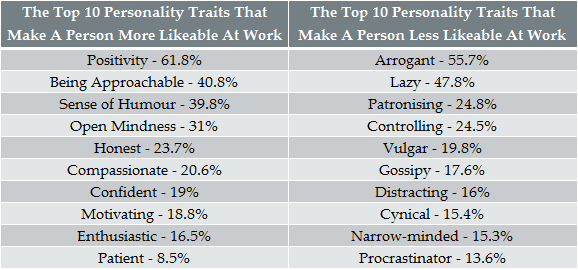The research, which surveyed 1,200 UK workers, also revealed that two thirds of workers felt that people who aren’t liked struggle to get ahead at work and the attributes which are less desirable include being arrogant, lazy and patronising.
The full list of traits which make a person more / less likeable at work included:
The research also revealed that 86.6 per cent of workers believe that being liked at work can get you further ahead in your career. Alongside this, almost two thirds felt that assertiveness is crucial to maintain respect among colleagues. And while over half agreed that those who are too nice struggle with assertiveness in the workplace, 91.8 per cent did state that it is possible to be both likeable and assertive.
Lee Biggins, founder and managing director of CV-Library, comments: “It’s only natural to want to be liked, especially at work when you’re dealing with a variety of people. But, it’s important not to get too caught up with the office politics. Instead, try and figure out the right balance that will help you to move forward with your career and ultimately, be respected by colleagues and senior management alike.
“Remaining true to yourself is key, especially as certain attributes will likely have landed you the job in the first place: listen carefully to feedback, be wary of coming across the wrong way and ultimately, don’t let your need to be ‘liked’ impact on your progression.”
Furthermore, nearly three quarters think that being overly nice to your manager will not get you further ahead at work, with 72.4 per cent saying the same about their colleagues. And, while 73.9 per cent believe that it is acceptable to express emotions in the workplace, over half of workers say it’s not okay to cry at work, with a further 86.1 per cent saying it is unacceptable to lose your temper.
Biggins continues: “Having some form of rapport with your manager is important as it enables you to be open and honest about your career goals, whether that’s in or outside the company you’re both working at. However, some workplaces will be stricter than others about this, so it very much depends on how much support you’d ideally like in your job. Ultimately, while the line between our personal and professional lives is becoming hazy, it’s best to keep it professional in the workplace and watch your actions: you never know when they might come back to haunt you!”



